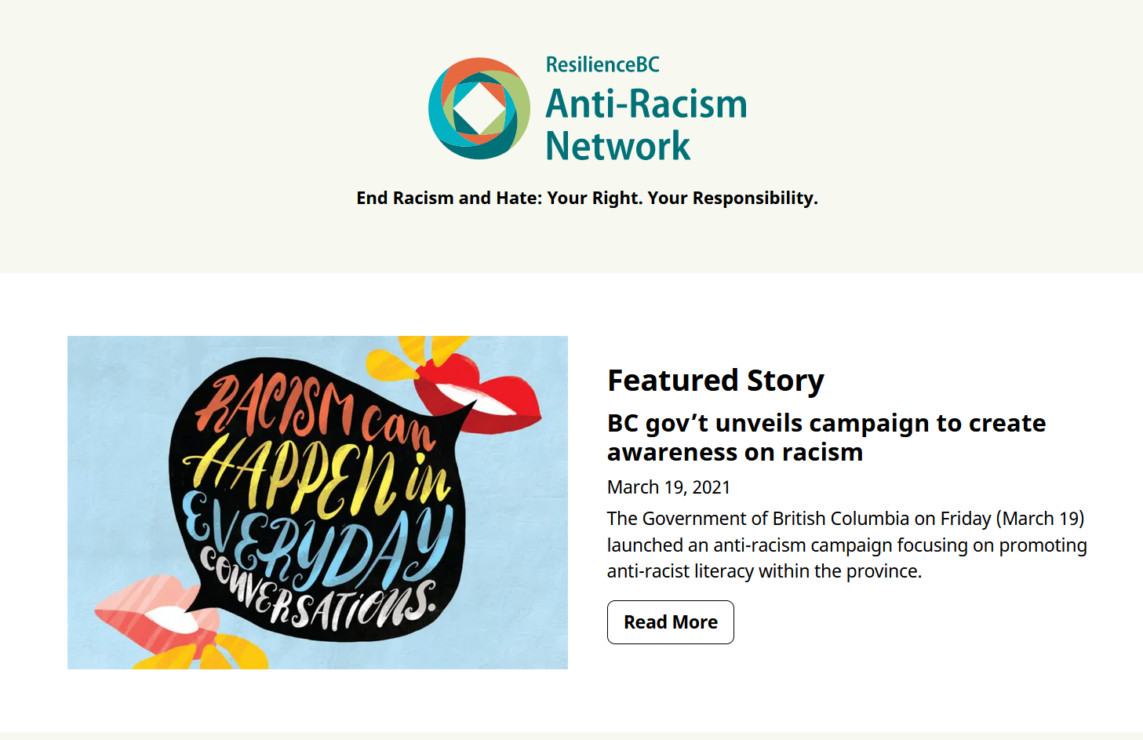
A network of anti-racism resistance, support, and resources.
On March 19, Resilience BC: Anti-Racism Network launched a new website that will provide support for anti-racism initiatives in communities across the province. The website includes a map with contact information for network members residing within each region, as well as educational tools, and “Report and Support” protocols.
“This new website will give British Columbians the support they need to quickly respond to racism, whether they are a witness or the victim of a hate crime,” said Rachna Singh, Parliamentary Secretary for Anti-Racism Initiatives in a press release for Resilience BC.
The network provides a wide range of online resources such as e-learning classes, videos, podcasts, and access to government surveys and statistics. It extends beyond the densely populated urban areas and reaches into various rural communities in British Columbia.
Jane Hurtig, Manager of multicultural and anti-racism programs at the Victoria Immigrant Refugee Center Society, and Director of the Resilience BC Anti-Racism Network Hub, notes that cities tend to have more access to anti-racism resources. Hurtig says it was important for the network to make efforts to create similar access in rural communities.
“The ultimate goal is to eliminate racism, [and] is to be normalizing the discussion about racism, to be helping people feel more comfortable with being able to address these really difficult and serious issues that infect our society,” Hurtig said.
Network members are spread across the province from Victoria to Terrace to Cranbrook. Florentien Verhage is the program’s local member for the Greater Victoria region, working for the Inter-Cultural Association of Greater Victoria. Students and community members can connect with Florentien Verhage by visiting the Networks BC anti-racism website.
Resilience BC: Anti-Racism Network is based on a ‘hub and spokes’ model. The hub is made up of three members while the spokes are represented as network members on the ground within each community.
The hub focuses on creating response protocols, managing the anti-racism network website and social media campaigns, sharing resources, and facilitating collaboration among network members.
There are 36 network members in more than 50 regions across British Columbia that work together to raise awareness about racism and its impacts by providing resources and services for victims of racism and hate.
Network members work in communities prioritizing public education and raising awareness, providing service for victims, as well as engaging with local police and school systems. Each network member works with a community committee. This committee is typically made up of the local school board, friendship center, a government member/representative, and the police.
Network members’ main focuses are public education, services for victims, and engagement with police and schools within their region.
The Network has developed community response protocols tailored to each individual community with information on how to respond to incidents of racism and hate and where to go for support.
Resilience BC’s: Anti-Racism Network provides guidance on how to respond and give support in situations where you may experience or witness racism or a hate crime. At www.resiliencebc.ca you can find information on how to report hate crimes, provide resources for victims in these situations, as well as contact information for regional network members.
In the website’s educational library, users can find electronic resources, as well as suggested websites, literature, and videos that provide education on race and racism informed by a variety of people doing work in this field.
These resources vary from “Bystander Intervention Trainings” with Hollaback!, and “The Canadian Anti-Hate Network,” to books such as “So You Want to Talk About Race” by Ijeoma Oluo, and links to videos that deconstruct racism such as “How to be an Anti-Racist,” and “Me and White Supremacy.” The network website provides educational tools from resounding writers and activists that are dedicated to deconstructing and dismantling racism.
The website’s launch accompanies a province-wide campaign to encourage conversation surrounding racism and to stand against discrimination. The campaign includes illustrations by IBPOC (Indigenous, Black and people of colour) artists across British Columbia that encourage individuals to reflect on their own internalized biases, and respond to racial discrimination. These pieces will be distributed and showcased across the province through media, schools, libraries, as well as within the Resilience BC: Anti-Racism Network.
Understanding and changing racism starts with curiosity and learning about issues that plague Western society, such as police violence against BIPOC folks, and colonial violence against the Indigenous community. In providing the opportunity for equity, Resilience BC: Anti-Racism Network is a source individuals across the province can reach out to for learning and support.
Resilience BC: Anti-Racism Network notes that their goal is a world free of racism. In an interview with the Martlet, Hurtig recites the Network’s message.
“The network is bringing communities together to do the hard work and make this vision a reality.”






